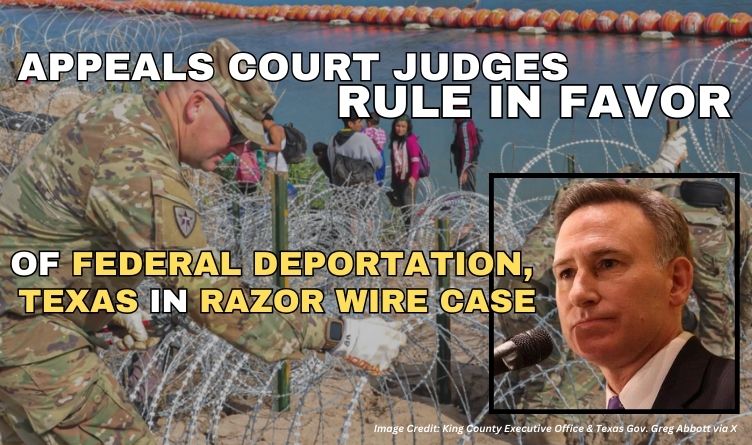Image: King County Executive Dow Constantine (inset) / Concertina wire is installed along the banks of the Rio Grande River as part of “Operation Lone Star,” Texas Gov. Greg Abbott’s border security mission. (background) Image Credit: Photo courtesy of the King County Executive Office & Texas Gov. Greg Abbott via X
By Bethany Blankley [The Center Square contributor] –
A panel of three judges unanimously ruled that the federal government has the authority to deport foreign nationals in the U.S. illegally over the objection of local authorities, while another panel of three judges ruled in favor of Texas in a lawsuit filed over its concertina wire barriers.

FEDERAL DEPORTATION
A 29-page ruling by the Ninth Circuit Court of Appeals was written by Judge Daniel Bress, with judges Michael Hawkins and Richard Clinton concurring.
At issue is an April 2019 executive order issued by King County Executive Dow Constantine, which directed county officials to prohibit fixed base operators on a county airfield near Seattle from servicing U.S. Immigration and Customs Enforcement charter flights used to deport illegal foreign nationals.
Constantine’s order prohibited King County International Airport in Washington State from supporting “the transportation and deportation of immigration detainees in the custody of Immigration and Customs Enforcement, either traveling within or arriving or departing the United States or its territories.”
The airport is located next to a major ICE-Seattle base of operations.
The Trump administration at the time sued, arguing Constantine’s order violated the Supremacy Clause’s intergovernmental immunity doctrine and a World War II-era Instrument of Transfer agreement allowing the federal government to use the airport in King County.
A district court agreed, ruling in favor of the federal government. King County next appealed to the Ninth Circuit.
The Ninth Circuit panel affirmed the district court’s summary judgment that the order violated the Supremacy Clause and the Instrument of Transfer agreement.
The panel also held that the federal government had Article III standing to sue and “had two related concrete and individualized injuries.” The first is “the inability to conduct the charter flights – which has increased ICE’s operational costs – constituted a de facto injury that affected the United States in a particularized, individual way” and “an imminent risk of future injury from the Executive Order.”
The second is the federal government’s injuries “were fairly traceable” and “are likely, as opposed to merely speculative,” as a result of the order. Were there no order, “an FBO would resume servicing ICE charter flights,” the court notes.
Constantine’s order violated the intergovernmental immunity doctrine because it “improperly regulated the way in which the federal government transported noncitizen detainees by preventing ICE from using private FBO contractors at Boeing Field, and on its face discriminated against the United States by singling out the federal government and its contractors for unfavorable treatment,” the court held.
With King County, as a so-called “sanctuary county,” Constantine argues its region “has acted decisively to become more inclusive, removing barriers to affordable housing, transit, health, economic opportunity and promoting strong childhood development for everyone.” The county has also set its “region apart as a leader in protecting the rights of all people in our communities, and continues to not tolerate discrimination, harassment, expressions of hate, or any behavior intended to promote fear, intimidation, or isolation,” he says.
Constantine’s argument was ideological, according to the order, stating federal “deportations raise deeply troubling human rights concerns which are inconsistent with the values of King County, including separations of families, increases of racial disproportionality in policing, deportations of people into unsafe situations in other countries, and constitutional concerns of due process.”
In response, the Department of Justice sued in February 2020, arguing his order was illegal, obstructed federal immigration enforcement and violated the Instrument of Transfer agreement under the Surplus Property Act of 1944. The Trump administration also sought to squash the executive order altogether and secure a permanent injunction against it.
A district court sided with the Trump administration, granted summary judgment. It held that Constantine’s order discriminated against ICE contractors while allowing others to use the airfield, and also violated the Instrument of Transfer.
King County appealed to the Ninth Circuit, arguing Constantine’s order was lawful.

TEXAS RAZOR WIRE CASE
The Fifth U.S. Circuit Court of Appeals ruled 2-1 in a case that may set the tone for two other cases before the court related to Texas’ border security operations.
Circuit Judge Stuart Kyle Duncan wrote for the majority, with Judge Don Willett joining him. Judge Irma Carrillo Ramirez dissented, arguing Texas did not meet “its burden to show a waiver of sovereign immunity or a likelihood of success on the merits.”
The ruling was issued 13 months after Texas sued the Biden administration after it destroyed concertina wire barriers it erected on state land.
The court was asked to decide whether Border Patrol agents can legally cut concertina wire fencing erected by Texas law enforcement along its border with Mexico. The Biden administration ordered Gov. Greg Abbott to remove it, arguing he was interfering with federal immigration operations. Abbott refused, arguing that the administration was facilitating illegal entry and violating federal law. In response, the administration ordered Border Patrol agents to use a bulldozer and remove wire fencing. Abbott sued, arguing they were destroying Texas property and Texas has the legal authority to erect barriers on state land.
Texas requested the district court to issue an injunction to block Border Patrol agents from removing the fencing, which it denied despite agreeing with Texas’ arguments.
The court “agreed with Texas on the facts: not only was Border Patrol unhampered by the wire, but its agents had breached the wire numerous times ‘for no apparent purpose other than to allow migrants easier entrance further inland,’” the Fifth Circuit’s 75-page ruling states. However, it denied Texas’ request arguing the federal government had sovereign immunity.
Texas next appealed to the Fifth Circuit, which granted the injunction pending appeal. The Biden administration appealed to the U.S. Supreme Court, which vacated the injunction without any stated reason.
The Supreme Court’s ruling didn’t deter Texas, which continued building and erecting concertina wire in the Eagle Pass area, and later established the military base for Texas’ border security mission, Operation Lone Star, there. OLS officers also expanded concertina wire barriers in other key areas along its border.
“The Texas National Guard continues to hold the line in Eagle Pass,” Abbott said at the time. “Texas will not back down from our efforts to secure the border in Biden’s absence.”
The three-judge panel ruled that Texas “is entitled to a preliminary injunction.” The ruling states that the Biden administration “clearly waived sovereign immunity as to Texas’s state law claims under § 702 of the Administrative Procedure Act,” which it says “is supported by a flood of uncontradicted circuit precedent to which the United States has no answer.”
The Fifth Circuit also rejected other Biden administration arguments, including that Texas was erecting barriers to safeguard its own property, not to “regulate Border Patrol.”
The ruling reversed the district court’s judgment and granted Texas’ preliminary injunction. The court also prohibited the federal government from “damaging, destroying, or otherwise interfering with Texas’s c-wire fence in the vicinity of Eagle Pass,” including Shelby Park, which Abbott shut down after learning that the Biden administration was using it as a staging ground to facilitate illegal entry into the US.
Abbott lauded the Fifth Circuit ruling, saying, “The federal court of appeals just ruled that Texas has the right to build the razor wire border wall that we have constructed to deny illegal entry into our state and that Biden was wrong to cut our razor wire. We continue adding more razor wire border barrier.”
Attorney General Ken Paxton also said the ruling was a “huge win for Texas.”
“The Biden Administration has been enjoined from damaging, destroying, or otherwise interfering with Texas’s border fencing. We sued immediately when the federal government was observed destroying fences to let illegal aliens enter, and we’ve fought every step of the way for Texas sovereignty and security.”
With weeks left in the administration, the concertina wire barrier case is unlikely to be appealed for a full court review.
In May, the court is scheduled to hear arguments on a lawsuit related to Texas’ marine barriers in the Rio Grande River, unless the case is dropped by the incoming Trump administration. Another case before the court is over Texas’ border security law, SB 4.



